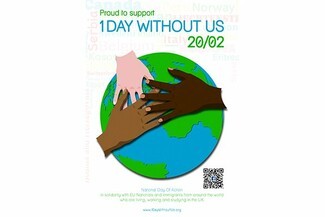UK Roma support action day for migrants

The Roma Support Group, a London based national charity, has teamed up with Roma migrants to show their support for today’s National Day of Action to recognise the contribution migrants have made to the UK.
The day of action, called ‘1 Day Without Us’, takes place today on the 20th February 2017 and coincides with the United Nations World Day of Social Justice.
Octav Copoti, a Roma from Romania who works in the construction industry, was one of many Roma connected to the Roma Support Group who welcomed the event.
“We, Roma, we struggle in our countries, it is very, very, difficult for us to find jobs”
“We, Roma, we struggle in our countries, it is very, very, difficult for us to find jobs there and to have a decent life,” he told the Roma Support Group.
“Here we find a country that offered us jobs, that accepted our children into schools, and that offered us so many opportunities.”
“When I was working on a construction site I was trying to do my best to show the appreciation and all my family is doing the same.”
“We all want to do our best to say thank you to Britain for offering us this opportunity”
“My relatives are working in restaurants, car wash, construction sites and we all want to do our best to say thank you to Britain for offering us this opportunity.”
The organisers of 1 Day Without Us have urged migrants from inside and outside the European Union, and everyone who supports them, to celebrate the often overlooked contribution that migrants make. The organisers have suggested wearing badges and lanyards, posting selfies or pictures that show your support, or putting posters in your windows.
“Some may wish to have a communal meal or a party with the migrants they have known as friends, colleagues, workmates and neighbours. Workers may take a five-minute silence or a mini-rally at lunchtime or tea-time,” they suggest.
Stanislaw (Stan) Kierpacz, a Polish Roma who trained to become a Karate instructor, said that the economy of the UK would suffer if there were no migrants:
“I think it is a great opportunity for migrants to show to the British how valuable we are,” he told the Roma Support Group.
“Without migrants the economic system would break down”
“Without migrants the economic system would break down because we work in many different fields, e.g. in factories, shops, retail, catering, hospitals, farming; but we are also executives, managers etc.”
“Without migrants the whole system would simply stop working. The British would not be able to find replacements easily.”
Blagoy Manchev and Emilia Mancheva are from Bulgarian Roma background and are working in the cleaning business. They also believe that the UK economy would suffer if all the migrants had to leave.
“We have to show all our opponents that we live in global world,” they told the Roma Support Group.
“And all economies, in UK and everywhere, are based on people's skills - it doesn't matter they are local or migrants. This why we are working. I doubt that English people will do this job. Could you imagine if more than 3 million migrants left this country? What a huge shock it will be for UK.”
“We need to be seen as an opportunity, not as a problem.”
Denisa Gannon also supports the day of action. Denise is Roma from the Czech Republic; her parents can’t read or write but Denisa completed a law degree and now she’s on a Justice First Fellowship and based at a law centre and is a joint chairperson of the National Roma Network. She is worried about her community in the UK and the effect that Brexit will have on them.
“Many left their country of origins to escape discrimination, racism and poverty”
“(The UK) Roma community are migrants usually from European Union,” she told the Roma Support Group.
“Many left their country of origins to escape discrimination, racism and poverty.”
“Now, we face uncertainty - what is going to happen after Brexit?”
“We came to the UK where we hoped to be treated with dignity, with our Human Rights taken into account.”
“Unfortunately, now we question whether after Brexit we are going to lose those rights and be facing unequal treatment as in our country of origins.”
“It is important to have a voice; however, the trouble is whether our voice is going to be heard. We as Europeans could have a voice. The question is how are we going to make ourselves be heard?”
